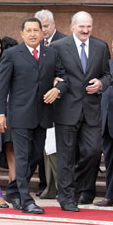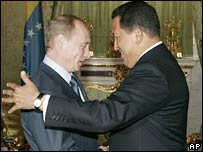A foray into Iraq
Well, it's carnival now, so in the season's spirit of reckless abandon I'll break all my rules and post something that has absolutely nothing to do with Venezuela. This piece is from The New Republic and I'm reprinting it simply because the reporting is so strong and the writing is so compelling.It's not that I necessarily agree with Kaplan, it's that I'd give one and part of the other to be able to write like him...
Centripetal Force
by Lawrence F. Kaplan
Baghdad, Iraq - For a return visitor, Baghdad International Airport offers a fitting portal into the new Iraq. Unlike the military side of the airport, where U.S. transport planes and helicopters operate in an industrious roar, the civilian side, which usaid renovated in 2003, now languishes in disrepair. Iraqi Airways flights, on which it was possible to light up a cigarette until recently, still come and go. But, in the terminal itself, the rest room floors are smeared with excrement, wires hang from the ceiling, and pay phones have been ripped from the walls. An emblem of war and poverty? Not really. The transportation minister, an ally of Moqtada Al Sadr and his rebellious Mahdi Army, has delegated responsibility for the airport's maintenance to the children of Sadr City, the Shia slum and the Mahdi Army's Baghdad base of support. The 14-year-olds in blue jumpsuits smoke, huddle, and even play tag. What they do not--and cannot--do is maintain an airport.
Not everything the U.S. enterprise touches here turns to gold. But everything it lets go of does seem to turn into dirt. With U.S. reconstruction aid running out, Iraq's infrastructure, never fully restored to begin with, decays by the hour. Iraq's political arena, from which the Americans had no choice but to withdraw, has dissolved into something unrecognizable, carved up for sectarian advantage and without a center to keep its parts from spinning away. In both cases, the United States may have given all it reasonably could be expected to give. But, when it comes to America's withdrawal from Iraq's security arena, a process that accelerates with each passing week, the only explanation can be that the White House, for all of its high-minded rhetoric about standing with Iraq, has decided not to. The insurgency continues to rage. Iraq's security forces still cannot operate on their own. And, as what was once a largely one-sided Sunni campaign of terrorism rapidly approaches something like parity (with the Shia taking up arms in their own defense), the likelihood of a civil war has surged. So, too, contrary to the delusions of war supporters and critics alike, has the importance of the Americans.
As the war takes a sectarian turn, the United States begins to look, even to many Iraqis, like an honest broker, more peacekeeper than belligerent. Sheik Humam Hamoudi, one of Iraq's most powerful Shia and a leader of the Supreme Council for Islamic Revolution in Iraq (sciri), knows this better than most. He sits, literally, atop the Iraqi government--in a sprawling office suite above Baghdad's convention center, where Iraqi politicians wheel and deal. As with many Shia politicians, Hamoudi, donning a clerical robe and turban, becomes animated when the subject turns to the U.S. military's campaign against Sunni insurgents. If anything, he believes it has been prosecuted with insufficient vigor. And, although he complains that the Americans have placed undue restraints on the Shia-dominated security forces, he likens the effect of a U.S. withdrawal from Iraq to "a child when he wants to walk and you ask him to play football." Absent the Americans, he says, Baghdad would be transformed into another Beirut.
Hundreds of miles to the west, in an Arabesque villa that rises out of the desert near the Syrian border, Sheik Abdullah Al Yawar--Hamoudi's mirror image in the Sunni community--echoes his concern. Al Yawar wields so much power in this insurgent hotbed that U.S. Army officers say he can turn the violence on and off like a faucet. For the moment, at least, he has turned it off, responding to pleas and aid from his American interlocutors. But he worries that the same Iraqi security forces that Hamoudi claims the United States has muzzled operate with too little American oversight. He claims they have been running amok through his province, beating and arresting his constituents and chanting Shia slogans. "If the Americans leave," he warns, "there will be rivers of blood." In their own way, then, both sheiks see the U.S. military presence for exactly what it has become: a buffer--between Iraq's sects and between relative order and complete mayhem.
---
Whether you measure Iraq's well-being through its infrastructure, politics, security, or even geography, one thing is clear: Where the Americans do not operate, very little else does. The level of corruption that pervades Iraq's ministerial orbit, for instance, would have made South Vietnam's kleptocrats blush. The problem extends beyond a simple lack of good governance. In a case that has been highly publicized in the Iraqi press, Sunni lawmaker Mishaan Al Juburi was recently charged with embezzling funds meant to pay for the protection of an oil pipeline in Iraq's north. Not all that unusual, but prosecutors suspect he then funneled the money to insurgents who blew up the pipeline.
According to a U.S. Government Accountability Office report published earlier this month, an interagency group of State Department, military, and contracting officials concluded that "critical infrastructure facilities constructed or rehabilitated under U.S. funding have failed, will fail, or will operate in suboptimized conditions following handover to the Iraqis." Absent U.S. oversight, politicians from competing sects have transformed the ministries into personal fiefdoms, where expertise counts for nothing and connections for everything. And, just as the ministries have proved impervious to direction from above, local factories and refineries ignore the ministries.
One of the reasons Baghdad has only a few hours of electrical power each day is that electricity plants in the provinces refuse to provide it--reasoning, as the head of a plant in Iraq's south put it, that Baghdad had enough power under Saddam Hussein. Although partly a consequence of the security situation, corruption has helped drive every public service measure--electricity, potable water, heating oil--down below its prewar norm.
The dysfunction works its way down to the street, too, which becomes apparent on a visit to the home of Bakr (he asked that his last name not be used), an engineering student who lives in the middle-class Waziriya neighborhood. One morning, as he was studying, Bakr explains, he looked out his window and noticed men setting up a mortar in the middle of the street. As the government encourages all Iraqis to do, he called the Interior Ministry's emergency line, 130, to report the insurgents. "They didn't answer," Bakr recounts.
"The next day, my friends warned me not to call, because your telephone number appears and they sell it to the insurgents." He insists we drive his Opel--the Humvee of the Sunni, as Iraqis call it--to an adjacent neighborhood so he can prove the point. There, faded on a wall, hangs the picture of a young man and the announcement of his death. The dead man, Bakr explains, got through to the emergency line.
nother casualty has been the authority of Prime Minister Ibrahim Jafari, whom the ministries routinely ignore. On the day the preliminary results of December's elections were announced, Jafari invites the election commissioners for dinner. The liberal activist Mustafa Al Kadhimiy wrangles two invitations, and, as we wait at the gate, Jafari's guards radio back and forth on their walkie-talkies--signing off with what, even in Iraq, stands out as religious phrasing: "Yes, believer." A concrete path leads to a footbridge and then across a moat, winding around Jafari's villa until it ends in a heated tent, which, Mustafa notes disapprovingly, is of Iranian vintage. But it is Jafari's relations with Iraq, not Iran, that most concern American officials here. Unlike his predecessor, Iyad Allawi, Jafari has a reputation for being cerebral, detached, and, most of all, weak.
His dinner guests look utterly exhausted. "The Sunni parties attack us," explains chief electoral officer Adil Al Lami. "We receive violence, assassination attempts." One commissioner seems to be on the brink of a nervous collapse. But not Jafari. As the commissioners pick at their kebobs, the prime minister announces that he has completed one of Thomas L. Friedman's books. Have I read The Lexus and the Olive Tree? As a television in the corner of the room conveys images of the carnage outside, Jafari admits to being partial to the works of Noam Chomsky. Why won't Chomsky come to Iraq? he asks. The commissioners don't know what to say. And, apart from expressing doubts about a Chomsky visit, neither do I. Later, asked if the prime minister offered this line of conversation for the benefit of a visiting American, a source close to Jafari responds, "No, this is how he talks in public. No one understands what he is talking about. But Iraqis--they like this. If they can't understand him, they think he knows something." Indeed, Jafari has become well-known for delivering inscrutable speeches that wander from Western philosophy to Arab literature and back again, leaving even seasoned translators perplexed. The confusion extends to his deliberations with the Americans. "Today, with our current government," Jafari tells me, "we tell the MNF [multinational forces] when to go. ... The MNF wait for our orders." Yet, when pressed on his relationship with coalition forces, Jafari sounds a more humble--and increasingly familiar--note. "If they leave today," he says, "we would be defeated."
Jafari's weakness notwithstanding, the imperial taint that colored the Coalition Provisional Authority (CPA) and its handpicked successor, Allawi, made it impossible for either to govern effectively. While Iraqis subsequently voted along sectarian lines, in this hollowed-out state, where tribe and religion remain the basic affiliations, this hardly came as a surprise. Even Mithal Al Alusi, one of a dwindling band of liberals still committed to the dream of a secular Iraq, has come to terms with the pathologies of Iraqi political life. Alusi made the mistake of traveling to Israel in 2004, and, for his sins, insurgents murdered his two sons. Bodyguards ring his house; a gun lies beside him on the couch. "The mistakes here are by the Iraqi side, not the American side," he says. "The Iraqi politicians only believe it is in their interest to push sectarian divisions." Kadhimiy echoes the sentiment. "Iraqi politics, it has moved beyond the Americans, except, you know, on security issues," he says. "There, the Americans, they still control everything."
---
With security having been the exclusive property of the Americans for so long, Iraqis still ask when full ownership of their country will be returned to them. The million-dollar trophy that National Security Adviser Mowaffaq Al Rubaie keeps in his home study suggests the restoration has begun. For many Americans, the memory of Iraqis (supported by U.S. forces off-screen) pulling down Saddam's statue in Al Firdos Square still provides an inspirational bookend to the U.S. invasion. For Iraqis today, the statue--or at least its head--just provides a bookend. As the national security adviser tells it, in the aftermath of the invasion, a senior American officer tried to abscond with Saddam's head. But he only made it as far as Kuwait, where the authorities alerted Rubaie, who subsequently reclaimed the head for Iraq. So here it sits, in the national security adviser's study, where Iraqi elites express their hatred for Saddam by hitting him on the head with the soles of their shoes. "I put it here to remember Saddam is always here," he explains.
Iraqi forces, Rubaie concedes, have not reached the point where they can operate independently of the Americans. As if to prove the point, an American military officer in civilian clothes hovers in the background, answers the national security adviser's phone when a reporter calls, lives and travels with Rubaie, and, his fellow government ministers say, probably does much of the national security adviser's job for him. At the same time, Iraq's security forces have started to emerge from the shadow of their American instructors. Their training has been accelerated, and, in the near future, Rubaie sees "Iraqi security forces taking over, Iraqi forces taking the front line, [and] MNF doing logistical and support [functions]. By the end of 2007," he predicts, "we're very likely to see the last U.S. soldier."
According to the U.S. military, the Iraqi police force currently fields about 121,000 men, close to the number planned for, while the Iraqi armed forces number about 106,000 soldiers, nearly two-thirds of the force estimated for the end of this year. The Iraqi army no longer melts away in combat, nor does it suffer from mass desertions, as it did during its first battles in 2004. Army recruits now undergo a basic training course similar in length to their American counterparts, officers attend service schools, and Iraqis provide much of the instruction. As the security forces grow more competent, they have rapidly expanded the amount of territory under their control, which now includes several neighborhoods in Baghdad and large swaths of western Iraq.
But the professionalism of Iraq's security forces can be overstated, which becomes apparent to me a week later in western Iraq. As a U.S. Army convoy approaches within a few hundred yards of a U.S. outpost at a castle in Tall Afar, gunfire erupts on all sides. The Humvees speed toward the castle gate, where an Abrams tank links up with them, providing the convoy with extra firepower as it winds its way toward a forward operating base outside the city. The shooting, officers back at the base say at first, came from insurgents. Neither I nor the soldiers caught in the middle of it had that impression, and an officer later confirms what we know to be true: The Iraqi police, overwhelmingly Sunni in this area, and the Iraqi army, overwhelmingly Shia and Kurd, were firing on one another.
Sectarian clashes present one problem. The fact that the Army still cannot operate without access to U.S. firepower, logistics, communication, and intelligence presents another. Even conceding the Bush team's fanciful premise that Iraq will have 110 combat battalions operating by the end of the year (compared with three fully effective battalions a year ago and 40 today), American officers dismiss as wishful thinking the official line that Iraqi troops can replace U.S. troops on a one-to-one basis and then operate just as effectively as their American mentors.
As for the Iraqi police, if civil war comes to Iraq, it may be ignited as much by them as by the insurgents. For Iraq's police are, to an extent not fully grasped in Washington, not police at all. As one of his parting acts in June 2004, CPA chief L. Paul Bremer signed Order 91, outlawing militias in Iraq. In response, thousands of Shia militiamen exchanged their street clothes for police uniforms. As they have gotten better at combating Iraq's Sunni guerrillas, the insurgency, at least in Baghdad and its southern outskirts, has weakened, with attacks declining since last fall. The only problem is that brutality is one of the tactics that achieved these results.
The Interior Ministry's extrajudicial antics first came to light last November, when U.S. troops stumbled across a torture chamber in Baghdad operated by Interior police. Every week brings more handcuffed and decomposed bodies discovered in garbage dumps, rivers, and hastily dug pits. "Scores of individuals are regularly detained in the middle of the night and without judicial warrant," a recent report by the U.N. Assistance Mission for Iraq says. "The rule of law continues to be challenged by the existence of militias and other groups who continue to act with impunity, confirming an urgent need for the State to assert control over its security forces." But these forces were never the state's to begin with. Unlike the Iraqi army, which operates in tandem with U.S. forces, the police recruit and operate locally, and, until recently, they did so largely free of U.S. supervision.
To rein in the brutality, American commanders have dispatched 4,000 military advisers to work and live alongside police and commando units. Sciri's Hamoudi, for one, chafes at the interference, claiming the Americans--by condemning abuses at the Interior Ministry and thereby creating a "general feeling that the U.S. and British are biased toward Sunnis"--have strayed too far from the embassy compound. Pointing to comments by American Ambassador Zalmay Khalilzad, Hamoudi says, "When the U.S. or British ambassador intervenes to press against Shia, it is illogical." But there is a logic at work here. Just as the Americans create a buffer for Iraq's Shia by training and equipping their security forces to combat the insurgency, they're also building a buffer for Iraq's Sunnis, who increasingly rely on the U.S. military to keep those same forces in check. In areas like Salman Pak and Tall Afar, the once viscerally anti-American Sunni population has even turned to the Americans for protection.
For a glimpse of what Iraq would look like in the event of a precipitous U.S. withdrawal, one need look no further than Tall Afar, where there was a precipitous U.S. withdrawal. Before the Third Armored Cavalry Regiment (3rd ACR) launched its offensive to clear Tall Afar last September, the city, like Falluja before it, had become a horror show. With only 400 soldiers from the 25th Infantry Division patrolling the roughly 10,000-square-mile sector around it, officers say, there simply weren't enough troops to pacify the city. During the Falluja offensive in November 2004, police stations across the province fell to insurgent attacks, and Tall Afar itself fell under guerrilla control. On the western side of the city, tension between Sunni and Shia tribes escalated into open warfare; the remnant of the Shia-dominated police force launched brutal reprisals against the population; and forces loyal to Abu Musab Al Zarqawi moved into the city, mounting their own campaign of atrocities--killing patients in the local hospital, kidnapping and beheading hostages, and forcing children to act as human shields. "I know people at home will roll their eyes," says one American officer, "but Restore Rights [the September 2005 operation to clear Tall Afar] cleansed this place of something genuinely evil."
Police headquarters in Tall Afar is located on the grounds of a centuries-old Ottoman castle, which sits on a large hill in the center of the city. From its parapets, one can usually see the entire city, but it is pouring rain, and even tanks slide in the mud. The castle also houses the mayor of Tall Afar, Najim Abdullah Jabouri, who, until recently, was the city's police chief as well. The mayor still operates as the city's de facto sheriff--a bullet-riddled police vest hangs on the wall of his office. The power has gone out, and it is freezing and nearly pitch-black, but the mayor seems relieved just to be here. Only a few months ago, he says, "Zarqawi was ejecting Shia from the city; and the sky--it was raining mortars. Now, we target the insurgents, not each other." Even today, 3rd ACR has Tall Afar locked down, with tanks on street corners and patrols crisscrossing the city. "The American Army is mediator and judge," the mayor says. "It is a higher authority than any institution in Iraq." So desperate, in fact, is the mayor to block 3rd ACR from leaving that he has penned a letter to President Bush, pleading for the unit to stay. "Our security forces are not well-equipped," he explains. "We are undertrained, nowhere near the situation where we can take care of our own responsibilities."
Still, the violence in Tall Afar has declined sharply. Following Operation Restore Rights, attacks on U.S. forces in Tall Afar dropped from about seven per day to one. At first, the city's Sunni leaders refused to cooperate with U.S. forces, citing the brutality of a Shia commando brigade operating in the area. But 3rd ACR had the brigade pulled back, and it released detainees whom the Sunni sheiks would vouch for. In addition, explains Lieutenant Colonel Christopher Hickey, whose Sabre Squadron operates out of the castle that houses police headquarters, "I knew I needed Sunni police to get information from the population. The Shia police were just inflaming sectarian violence." After pressing local leaders to encourage police recruits, Sunnis began to sign up, eventually swelling an exclusively Shia force of 200 into a majority Sunni force of 1,700. And, as Hickey predicted, intelligence tips began flowing in. The regiment also poured millions of dollars into the city, funding 150 water, electricity, school, and cleanup projects. At the same time, it embedded advisers with Iraqi army and police units. Today, 3rd ACR personnel live among Iraqi platoons and among the population itself, having fanned out across the city and established 29 patrol bases--including directly between the warring Sunni and Shia tribes.
---
Having melted into a once-hostile population center, the Americans have become an essential part of the landscape here--their own tribe, in effect. Seen from a helicopter roaring above Nineveh province, telephone wires provide the only evidence of modernity among the ancient forts, castles, and clay huts that dot the plain below. In this primitive universe, it's easy to confuse the door gunners, their aviation helmets emblazoned with Superman logos (the "S" actually stands for their unit, Stetson Troop), with actual supermen. Which many Iraqis do: Wedged between tribes of Sunnis Arabs, Turkomen, Shia, and Kurds, a regal and persecuted people--the Yazidis--call Nineveh province home. The Yazidis, who, among other things, don't wear blue, don't eat lettuce, and take a somewhat nuanced view of Satan (their Muslim neighbors have accused them, falsely, of being devil worshippers), initially confused the arrival of the Americans with the Second Coming. An officer at the forward operating base in Sinjar elaborates: "They think that, um, we're Jesus."
The Yazidis aren't the only ones. At a base in central Iraq a few days earlier, two U.S. helicopters taxi to a halt near a C-130. The crew chiefs jump out and guide two rows of detainees, handcuffed and blindfolded, away from the prop blast. A detainee's fate, as I learned last year on stumbling across a similar scene in Baghdad, depends largely on his destination. The idea of prisoners begging to get into Abu Ghraib may seem like a stretch, but, more than anything else, they fear being turned over to the Iraqi security forces. They know the Americans probably won't kill them, and that, in all likelihood, they will be released in a few days.
As for the Americans themselves, the soldiers value their roles here just as much as the local population does. Back at regimental headquarters, framed pictures of the fallen line the wall--3rd ACR has lost 42 men during its yearlong tour, and many more have been terribly wounded, including the regiment's command sergeant major. And, yet, contrary to the faux moral posturing of those who claim to speak for the troops back home, when the troops do speak, what they say is invariably some variation of "leave us alone to do our job." The soldiers' confidence in their mission derives in part from a sense of ownership that the Army has about Iraq. While Colin Powell's reported warning on the eve of the invasion--"If you break it, you own it"--applies even as the war grinds toward the end of its third year, for the Army at least, it is equally true that, when you break it, it owns you. Having bled so much here, the officer corps cannot entertain the possibility that they did so in vain. Its members truly believe that victory, even at this late date, may be within reach.
In Tall Afar, it genuinely is. To be sure, 3rd ACR, which a Pentagon review of dozens of units in Iraq rated as the most adept at counterinsurgency, hardly counts as a typical unit. There are, to begin with, the officers gathered around the commander, among them a Harvard graduate student wounded here and a Middle East historian who can recite every detail about British operations around Tall Afar in the 1920s. There is the Iraqi-American interpreter who has established himself as a power broker among Nineveh's clans. There is the regiment's self-contained aviation squadron, its gunships baring snarling shark's teeth and its scout choppers having shut down infiltration across the Syrian border. Then there are the soldiers themselves, who benefited from unusual training (devoted largely to counterinsurgency as well as to Iraq's customs and language) and whose professionalism in dealing with Iraqis arguably has yielded more diplomatic triumphs than the combined exertions of every Foreign Service officer in Iraq.
There is, finally, the commander himself. With his raspy voice and shaved head, Colonel H.R. McMaster bears a closer likeness to the brusque officers that Robert Duvall brought to life in Apocalypse Now and The Great Santini than to the tweedy scholar on the book jacket that made him famous. McMaster's Ph.D. dissertation, which scolded the joint chiefs of staff for not protesting more forcefully Lyndon Johnson's march to war in Vietnam, appeared in 1997 as a book--Dereliction of Duty--that became required reading at the Pentagon. A parade of retired generals has wielded Dereliction of Duty as a club against today's military leaders, charging them with the same sins that the book accuses their Vietnam-era predecessors of committing. But, if McMaster sees parallels to the civil-military relations of the Vietnam era, he's not saying. When it comes to the operational realm, however, he freely concedes to drawing from the Army's experience in Vietnam. "The important thing that emerges from Vietnam is that the political, economic, and military have to go together," he says. "You have to isolate insurgents from external support. You have to develop security forces. You have to provide security for the population." Which is exactly what he did in Tall Afar, having enshrined the principles of counterinsurgency in his unit's tactics well before the term returned to favor in Washington last year. The press, in turn, has anointed McMaster a latter-day John Paul Vann, and an army of journalists has descended on this remote corner of western Iraq. (A sergeant complains that his soldiers still distract themselves with tantalizing images of Lara Logan, the swimsuit model-cum-"60 Minutes" correspondent, who dropped in from the sky recently.)
In an Army that has spent three years launching big-unit sweeps, relying heavily on firepower and otherwise heeding ground commander Lieutenant General Thomas Metz's admonition not to "put much energy into trying the old saying 'win hearts and minds,'" 3rd ACR has done exactly the reverse. Yet, rather than duplicate the Tall Afar operation in towns and cities across Iraq, the White House's "National Strategy for Victory in Iraq" declares, "Our forces will increasingly move out of the cities ... and conduct fewer patrols and convoy missions." The administration intends to draw down troop levels to 100,000 by the end of the year, with the pullback already well underway as U.S. forces surrender large swaths of the countryside and hunker down in their bases. The plan infuriates many officers, who can only say privately what noncommissioned officers say openly. "In order to fix the situation here," Sabre Squadron's Sergeant José Chavez says, "we need at least 180,000 troops." Iraq, however, will soon have about half that. An effective counterinsurgency strategy may require time and patience. But the war's architects have run out of both.
---
Al Yawar, the most powerful Sunni sheik in 3rd ACR's area of operations, cannot grasp this essential truth. So he has invited Colonel Joel Armstrong, the regiment's one-man State Department, to lunch. En route, Armstrong's helicopter and another Black Hawk flying escort wind along creek beds, hugging the desert floor. Eventually, the bleached landscape below yields a surprise: a miniature Versailles. A few hundred yards from the sheik's compound, the choppers set down next to a horse corral. An army of security guards--tribesmen with New York Yankees caps--usher the colonel and his fellow officers inside, where the combination of marble floors, ornate chandeliers, gilded wall trim, and a roaring fireplace casts them all in an orange glow. As for the sheik, despite the robe, headdress, and gold sash tied across his waist, he bears an uncanny resemblance to John Gotti.
He wields a similar power, having, as the colonel points out, "convinced his people not to fight us and be peaceful." The sheik presents Armstrong with a list of detainees he wants released and asks about a paving project the Americans have promised. The local mayor, it seems, has embezzled the funds, and Al Yawar would like the Americans to supervise the project more closely. More than that, he would like assurances the Americans will stay. "The government is not listening to the Sunnis," he explains. The Iraqi army, in particular, incenses him. "They hit and kick people. They are not from this region." By contrast, "The Americans--they are in the middle. They are on neither side. This is why we trust them. But, if the Americans leave, who will I talk to?"
Back at the base after lunch, Armstrong mulls over the meeting. Along with the rest of the regiment, he will head home soon. During his year here, he developed a close relationship with the sheik, and he will clearly miss his Iraqi counterpart. Armstrong shares some of the sheik's concerns, and he shares what could well be the epitaph for the U.S. enterprise in Iraq. "We're only an honest broker," he says, "so long as we're here."
See you all after the holiday...
|


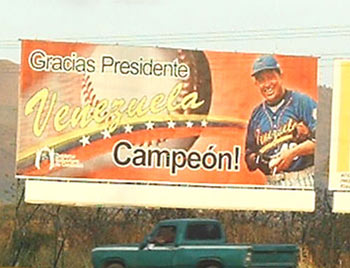
 Chavez Reelection Blog: Katy documents the government's use of public resources for Chavez's partisan advantage.
Chavez Reelection Blog: Katy documents the government's use of public resources for Chavez's partisan advantage.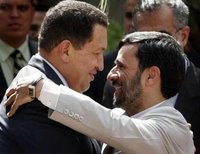
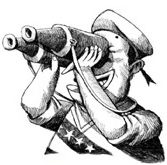
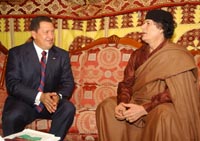
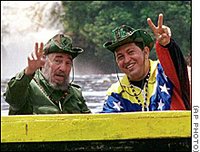
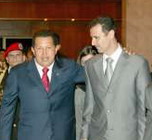
 Site feed
Site feed 